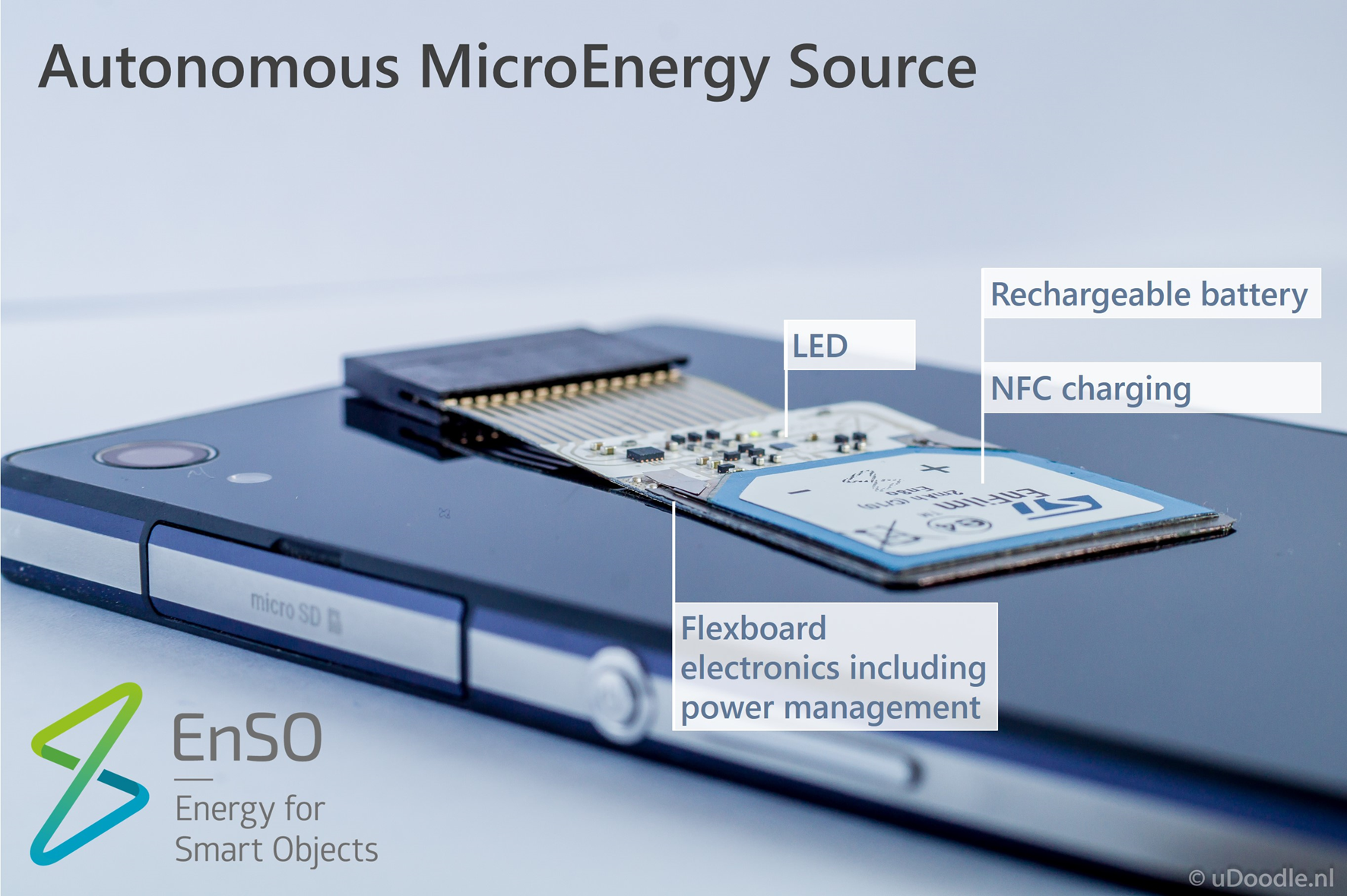- Published on 03 Sep 2018
- Project News
EnSO
Autonomous Energy Systems for IoT
24 Billion of connected devices are expected to operate worldwide by 2020. At this period of time, more than 1/3 of this quantity is expected to be IoT Smart Objects.
Smart objects have to be autonomous, easy to use and handle, as small as possible, robust and long lasting with a long operating life time! Whatever they will be, there is always a key ingredient for all the electronic systems which is the need to be powered with a minimum of energy. Energy is key for IoT Smart Objects emerging market.
EnSO (Energy for Smart Objects) is an ECSEL JU project which aims to answer the need for energy solution for IoT, with the goal to provide Autonomous Micro Energy Sources (AMES) composed of micro storage, energy harvester, smart charger and power conditioning IC elements mounted on a flexible module.
The scope of EnSO project encompasses energy solutions for powering objects in Smart Society, Smart Health and Smart Energy key applications. As an ECSEL Innovation Action, EnSO’s work addresses the market replication, demonstration and technological introduction activities. EnSO ecosystem involves all of the value chain - from key materials and tools to many demonstrators in different fields of application.
EnSO has set up a unique European ecosystem in the field of high-performance autonomous miniature energy-harvesting power sources for IoT market in Europe. It combines the advanced industrial capabilities of 6 pilot lines & advanced technological platforms with competences in thin films microbattery, energy harvesting solutions and assembly & packaging solutions. With 32 partners from 8 countries, EnSO gathers various collaborators from Academia, Research Technology Organisation and Industry. In particular, the EnSO project benefits from a strong involvement of end-users, with a total of 23 Industrial partners in which 12 are Large Entreprises.

Partners in EnSO are developing high reliability assembly technologies of shapeable and customizable micro batteries, energy harvester and power management building blocks, and set up a competitive high volume production.
Rechargeable micro battery is based on a thin film solid state process and advanced lithium chemistries. It shows very high capacity and very high density (> 300Wh/l), low profile, and long life time and allow for free form factor design. Customizable smart recharge and energy harvesting enabling technologies for AMES include solar, thermoelectrical or mechanical systems. EnSO has built its first AMES generation that was delivered to end-users for integration in products, and is currently building a second version.
Several use-cases have tested the designed AMES. For instance, AED engineering has developed an Indoor localization system based on Ultra-Wide Band protocol, in which a tag can be very accurately localized in a room, thanks to four anchors. The tag is a Non-Form Factor device which is powered by the EnSO AMES system with a Photovoltaic (PV) cell harvester. The system shows a high 2D accuracy and a reduced power consumption, with a good energy yield from the PV cell harvester. In the field of smart society, Ojmar is building a smart lock, which can be opened by simply using a phone, while Naturgy has been developing a gas network monitoring device which harvests energy from a thermoelectrical systems designed by Mahle. An example of the use of AMES in smart health is the development of an autonomous body sensor for chronic diseases management, designed by Maastricht Instruments, or the production of an autonomous pacemaker by the partner Cairdac.

To increase collaboration and visibility, EnSO has reached other European projects in the field of IoT and flexible materilas, such as VICINITY and InSCOPE. Both collaborators have participated in the event organized by EnSO during the IoT week in Bilbao, in June 2018. Discussions led to the conclusion that for the European Research in IoT to grow and continue to compete at an international level, interaction between European projects is strongly needed.
All together, EnSO is building a new system for powering Smart Objects, by fostering strong collaborations and promoting its AMES systems.
For more information, please visit the EnSO project website (http://www.enso-ecsel.eu/) or subscribe to our newsletter (enso.ecsel@gmail.com)


